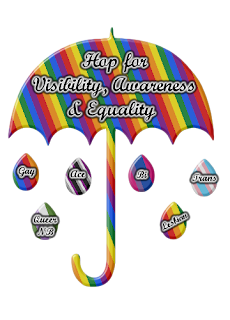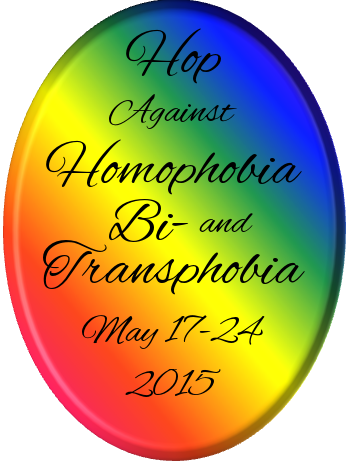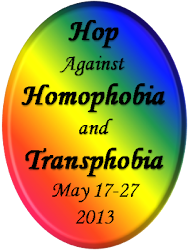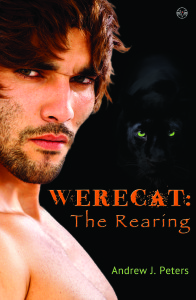Updated to add on 5/25/2016: Thanks so much to everyone who hopped over! My contest is closed, and the winner selected by Random.org is Lee! Congratulations, and I’ll be in touch shortly to arrange for your prize!
I’m proud to be participating in the Hop for Visibility, Awareness, and Equality (formerly the Hop Against Homophobia and Transphobia), which is an annual action by folks in the publishing industry that supports the International Day against Homophobia and Transphobia (#IDAHO) on May 17th.
This is my third year being part of the Hop. Here’s how it works: Read my brief post, drop a comment below with your e-mail address, and you’ll be entered in a raffle for your choice of any e-book from my backlist (Werecat #1-3, The Seventh Pleiade, or Banished Sons of Poseidon).
IDAHO brings awareness to injustice around the globe, and as a gay man and an LGBT activist living in the United States, I’ve always felt privileged in relation to the millions of LGBTs living in countries where being LGBT is persecuted and criminalized.
The status of LGBTs in the United States is complicated to unpackage, but the fact that many of us live openly, with rights supported by statutes and growing social acceptance, places us heads above the vast majority of LGBTs around the world.
Improving conditions for LGBTs in Africa, the Middle East, Russia, Asia, and parts of Central and South America must be a top priority for all us of. I chose to write about the situation here in the U.S. because I believe that countries ‘leading the way’ have a responsibility to take inventory of themselves in order to better lend resources to our friends around the world.
I remember the mixture of happiness, admiration and touch of disbelief I felt when I first saw these t-shirts come out in 2012, following the U.S. Supreme Court decision that all states must extend the right to marry to same-sex couples.

T-shirt created by Geeks Out
It was definitely an appropriate time to celebrate and ‘flaunt’ our hard-won success. Over the past year or so, those t-shirts have reminded me how fragile progress is.
We’re facing a new wave of anti-LGBT political action, exemplified most recently and visibly by North Carolina’s regressive law blocking local anti-discrimination ordinances. It’s hardly an isolated attack on LGBTs. State legislatures across the country are working to maintain second class status for us via “religious freedom” laws, sparked in part by anti-LGBT celebrity Kim Davis who in 2014 made headlines for refusing to issue marriage licenses to same-sex couples in Kentucky.
Mississippi, Georgia, Tennessee and other states have introduced legislation to exempt businesses from non-discriminatory employment practices and even providing services to LGBTs. The media often focuses on the absurd ramifications of the law, such as bakeries that refuse to make wedding cakes for gay and lesbian couples, and pizzerias that turn away LGBT patrons. I don’t think those are the kind of situations that have the most impact on LGBTs in our daily lives. Lots of other implications will. Keeping with #IDAHO’s 2016 theme “Mental Health and Wellness,” a better example of the scary impact is health and mental health providers refusing services to LGBT people based on “moral” objections.
If this sounds like a huge step backward for social justice, and quality of life, I think you’re absolutely right. If it sounds like the familiar organizing ploy of Republican fear and hate-mongering to mobilize their evangelical Christian base for the upcoming elections, I think you’re absolutely right as well. We’ve lived through the proliferation of Defense of Marriage Acts (DOMA) in the 90s and 2000s. Before that, we dealt with the military’s “Don’t Ask, Don’t Tell” policy, and state initiatives to prohibit gay/lesbian couples from raising children.
Like today, those efforts tended to be a reaction to LGBT advances (a backlash), and tended to coincide with attacks on other vulnerable minorities such as immigrants, as well as women’s reproductive freedom.
Social justice advocacy can feel unending. Once we’ve made progress on one front, a new threat emerges to remind us that we must be vigilant to protect the gains we’ve achieved. I do believe, by and large, the United States continues to move in the right direction, but we cannot be complacent. I remember a dialogue in the media following the Supreme Court decision with some people questioning whether or not the LGBT civil rights movement had become obsolete given its successes.
I think we can all look back on that conversation from a wizened perspective. Beyond the regressive backlash that must be fought, we have a long way to go in realizing fairness and dignity for transgender people; and clearly the climate for American LGBTs varies greatly depending on where we live, as exemplified by the recent British travel advisory for gay travelers to southern states in the U.S.
What do you think? Drop a comment below and I’ll enter you into my drawing for your choice of any e-book from my backlist, to be announced on May 25th 12:00 AM EST. I also encourage you to check out this list of Hop participants below and hop around to grab more chances to win lots of other prizes.





